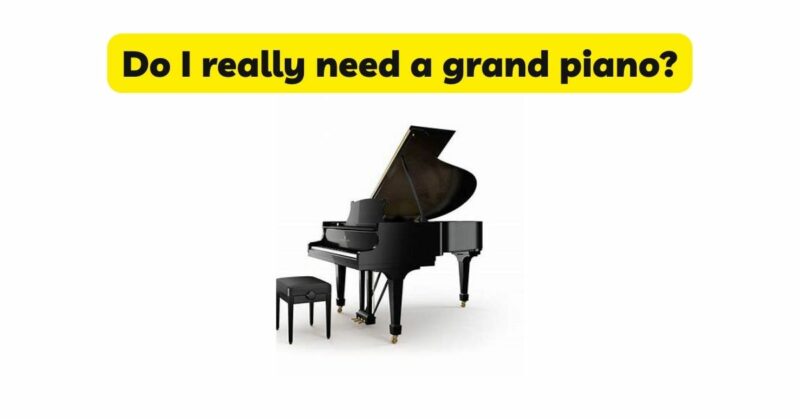The grand piano, with its majestic presence and rich tonal quality, has long been regarded as the pinnacle of musical instruments. However, for aspiring pianists and enthusiasts, the question often arises: “Do I really need a grand piano?” The decision to invest in a grand piano is not to be taken lightly, as it involves considerable financial commitment and space considerations. In this article, we will delve into the factors that influence the necessity of owning a grand piano, including the player’s skill level and aspirations, the availability of alternative options, space constraints, budget considerations, and the potential for creative exploration. By carefully examining these aspects, we aim to provide a comprehensive perspective on whether owning a grand piano is an essential requirement for pianists.
- Skill Level and Artistic Aspirations: One crucial factor to consider when contemplating the need for a grand piano is the pianist’s skill level and artistic aspirations. Professional concert pianists, composers, and performers who require a broad tonal range, dynamic expressiveness, and the ability to convey intricate nuances may find a grand piano indispensable. Its responsive touch and rich sound quality enable these musicians to achieve a higher level of artistry and connect deeply with their audience. However, for beginners or casual players who are still developing their skills, alternative options may suffice.
- Availability of Alternative Instruments: While the grand piano offers unparalleled sound and performance capabilities, it is essential to acknowledge the availability of alternative instruments that can meet the needs of pianists at different skill levels. Upright pianos, digital pianos, and hybrid instruments have significantly advanced in recent years, providing quality sound reproduction, realistic touch sensitivity, and a wide range of features. These alternatives can offer an authentic playing experience and adequately serve the needs of pianists who may not require the specific attributes of a grand piano.
- Space Constraints and Practical Considerations: One of the primary factors influencing the decision to acquire a grand piano is the availability of sufficient space. Grand pianos are large and require a dedicated area in which to be placed. Consideration must be given to room size, acoustics, and the logistical challenges involved in moving and positioning the instrument. In situations where space is limited, an upright or digital piano may be a more practical choice, as they have a smaller footprint and are more easily accommodated in smaller living spaces.
- Budget and Financial Considerations: The cost of purchasing and maintaining a grand piano can be a significant deterrent for many individuals. Grand pianos are generally more expensive than alternative options due to their intricate craftsmanship and premium materials. Furthermore, the maintenance and tuning costs associated with a grand piano can be higher compared to other piano types. Evaluating one’s budget and financial circumstances is essential to determine whether owning a grand piano is a feasible investment.
- Creative Exploration and Musical Expression: While the grand piano offers unique attributes, it is worth considering how essential these features are to an individual’s musical journey. Some pianists may find that alternative instruments, such as digital pianos or keyboards, offer a broader range of sounds, built-in recording capabilities, and connectivity options that facilitate creative exploration and experimentation. Additionally, the use of technology allows for the incorporation of various instrument sounds, effects, and recording possibilities, which can expand the scope of musical expression.
- Personal Preference and Emotional Connection: Ultimately, the decision to own a grand piano is a personal one. Beyond the practical considerations, there is an emotional and aesthetic aspect to owning such an instrument. The allure of a grand piano’s craftsmanship, presence, and the emotional connection it evokes can greatly impact one’s motivation and dedication to playing. If the grand piano holds a special place in one’s heart and contributes to a deep sense of joy and inspiration, then the necessity of owning one becomes a subjective choice that transcends practicality.
Conclusion: Determining the necessity of owning a grand piano requires a thoughtful evaluation of various factors, including the player’s skill level, aspirations, available alternatives, space constraints, budget considerations, and personal preferences. While the grand piano undeniably offers unparalleled sound quality and artistic potential, it may not be an absolute requirement for every pianist. Consideration should be given to alternative instruments that can adequately meet the player’s needs and constraints. Ultimately, the decision to invest in a grand piano should align with the individual’s musical goals, financial circumstances, available space, and the level of creative exploration and emotional connection they seek to achieve through their musical journey.


